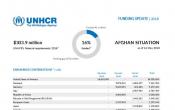Pakistan
Operation: Pakistan
Location
{"longitude":69,"latitude":30,"zoom_level":0,"iso_codes":"'PAK'"}
By clicking on the icons on the map, additional information is displayed.
Key Figures
| 2018 planning figures | |
| 54,500 | primary school aged children will be enrolled in primary education |
| 20,000 | extremely vulnerable refugee households will receive core relief items |
| 20,000 | identity documents will be issued for the Pakistan returnees from Afghanistan |
| 5,000 | people of concern, particularly the youth, will benefit from vocational/technical skills training to improve livelihood |
| 70 | educational facilities will be constructed or improved in the host communities |
| 2016 end-year results | |
| 100% | of people of concern had access to national primary health care |
| 100,000 | children were registered and issued documentation under regular birth registration procedures |
| 1,270 | people of concern were trained on sexual and gender-based violence (SGBV) prevention and response |
| 47 | education facilities were constructed or improved, and the strategy to promote admission to national education system was established |
| 20 | litres of potable water was made available in camps per person per day |
Latest Updates
People of Concern
26%
Decrease in
2016
2016
| 2016 | 2,510,749 |
| 2015 | 3,390,353 |
| 2014 | 2,962,782 |

[["Refugees",1352560],["Asylum-seekers",4856],["IDPs",448956],["Returned IDPs",704370],["Returned refugees",7]]
Loading ...
Pakistan
< Back
2017
{"categories":[2013,2014,2015,2016,2017,2018],"budget":[161.35432216,162.48358814,136.70262985,137.352355659,127.07320187,99.20166917],"expenditure":[60.30982274,64.49818564,64.26438087,54.72576009,53.21599053,null]}
{"categories":[2013,2014,2015,2016,2017,2018],"p1":[59.97018945,57.67569721,58.40259877,68.04881327,63.73213975,68.62045115],"p2":[1.48910797,0.21242026,0.30424051,0.23462954,0.235,0.599],"p3":[59.67971779,60.84901445,49.6136171,50.34262892,59.04825415,28.98221802],"p4":[40.21530695,43.74645622,28.38217347,18.726283929,4.05780797,1]}
{"categories":[2013,2014,2015,2016,2017,2018],"p1":[30.48784343,33.37477024,27.95927853,31.68652771,34.23735457,null],"p2":[0.0786895,0.18566753,0.2060976,0.15099556,0.13975851,null],"p3":[13.69849557,9.8252259,18.78861072,16.56428054,17.49127573,null],"p4":[16.04479424,21.11252197,17.31039402,6.32395628,1.34760172,null]}
Loading ...
CHOOSE A YEAR
- 2014
- 2015
- 2016
- 2017
- 2018
The 2017 Year-End Report will be available shortly.
Working environment
After nearly four decades of protracted displacement, Pakistan still hosts over 1 million registered refugees, holders of Proof of Registration (PoR) cards.Since July 2016, and due to a complex set of security and political factors, there has been a surge in the return of Afghan refugees from Pakistan. As of end December 2016, over 380, 000 Afghan refugees have returned to Afghanistan this year alone. All efforts are done to promote a voluntary, safe, dignified and phased return, with the framework of the Solutions Strategy for Afghan Refugees (SSAR).
The Refugee Affected and Hosting Areas (RAHA) programme, another key element of the SSAR, will continue to provide enhance support to host communities and promote peaceful co-existence.
Funding gap on both important elements of the SSAR, voluntary return and RAHA programme, would have a direct impact on regional stability.
In the meantime, the vast majority of the remaining internally displaced families affected by the security operations in the Federally Administered Tribal Areas (FATA) and Khyber Pakhtunkhwa (KP) are expected to return and UNHCR plans to responsibly disengage from its protection cluster responsibility by the end of 2017.
UNHCR and partners are also planning for the return of people who were displaced from North Waziristan in Pakistan in 2014 and remained in Afghanistan.


